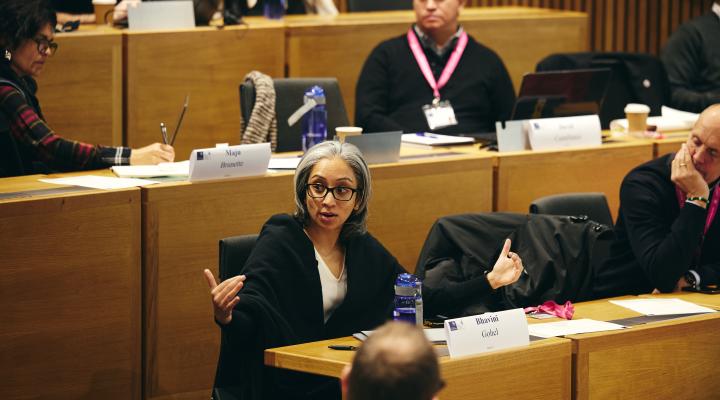Knowledge to innovation
Knowledge is important for organisations to remain successful, and for knowledge intensive organisations where knowledge is the core organisational strategic activity, it may be the critical and distinctive edge to outperform their peers. Creativity can give rise to novel ideas that are likely to be useful and lead to innovation in business. The core capability of employee knowledge and the team norms to allow divergent thinking are keys to innovation. Knowledge intensive organisations pack novel knowledge into innovative products, processes or services. Knowledge, however, has a paradoxical relationship with creativity, therefore it may enhance or block the creative process.
Intuition to innovation
While by definition knowledge is information that is relevant, actionable and experiential, intuition can be defined in a similar way. We act on our intuition and therefore it is actionable and relevant, likely experiential too, but intuition, unlike knowledge, is not strictly ‘information’. At an individual level, the unarticulated and tacit knowledge may, however, be the source of intuition. Can one say that an occurrence or an episode of intuition is the same as a ‘hunch’? And as several hunches over a period lead to innovation, is incremental intuition therefore also the path to innovation? Can that lead to original and divergent thinking?
Learning to reflection
These and more such musings are not uncommon to my mind after each new module intensive week. After the recent one on innovation in healthcare, recognising the relationship between knowledge and creativity - the inimical as well as the facilitating - I feel inspired to explore the pathways to innovation, some more philosophical than iterative. I am also quietly pleased at the intellectual stimulus the intensive residential week generates - facilitated by the masterly content shared by the faculty, the fireside chats with world-leading experts in the field, and the interactions and the camaraderie with the cohort – and for the enriching discussions and sharing of each other’s expertise in their individual fields. We as a cohort seem to have developed a powerful coalition, a reservoir of expertise and knowledge, in an academic space.
Systems thinking and innovation
Just like a systems thinker will map the system and interdependencies to solve the wicked and complex adaptive problems, the process of innovation requires mapping the interdependencies and adapting the strategy to the innovation ecosystem. This is vital for success or for the innovative product to be introduced to the end user at the most opportune time. The systems thinkers identify the gaps, identify the underlying inhibitory mental models and think of changing the paradigms to solve the complex problems. An organisation with a timeline to an innovation that is a part of a bigger innovative product will need to be mindful of the challenges of bringing their own innovation to life, coordinating with complimentary innovators and having the solution adopted across the value chain.
Idea to implementation
The idea generation, while fundamental, is not the innovation itself. One will generally go through a repetitive and serial process of idea generation and recurrent hunches to launch the process of incremental innovation. The latter will eventually, after the process of concept development and implementation, lead to the final product, process or service. Innovation can be central to changing the paradigms at individual, team and organisational level. The way management in an organisation responds to the divergent thinking can determine the organisations’ ability to innovate. It requires courage to be vulnerable, to stand out and think differently; to identify the gaps, to dare making mistakes and to stand up and persevere after repeatedly failing. Stakeholder engagement along with recognition of the context, are critical for adoption at all levels. This statement perhaps can be stressed upon several times to underline the importance of the stakeholder engagement, relationship building and the context.
Perseverance and purpose
In her bestselling book ‘Mindset’, Carol Dweck, the Stanford psychologist, proposed the idea of ‘growth mindset’ as being the ability to make mistakes, learn, reset and restart. The ability to keep going in the face of adversity and failure was identified in her research as the critical success factor for long term success. Similarly, Angela Duckworth, a MacArthur Fellow and University of Pennsylvania psychologist, in her best seller, ‘Grit’, identified ‘perseverance’ as the factor determining success, stating ‘Be like the postage stamp, stick to it until you get there.’
I left Oxford this time feeling that my mind has been focussed on to the pertinent issue of how innovation may be the solution to the challenges facing healthcare at a global level. It is quite empowering to know that new knowledge, while getting embedded in the intuitive recesses of my brain, may be shining light on my blind spots. When the lights are on, I will find the way.





